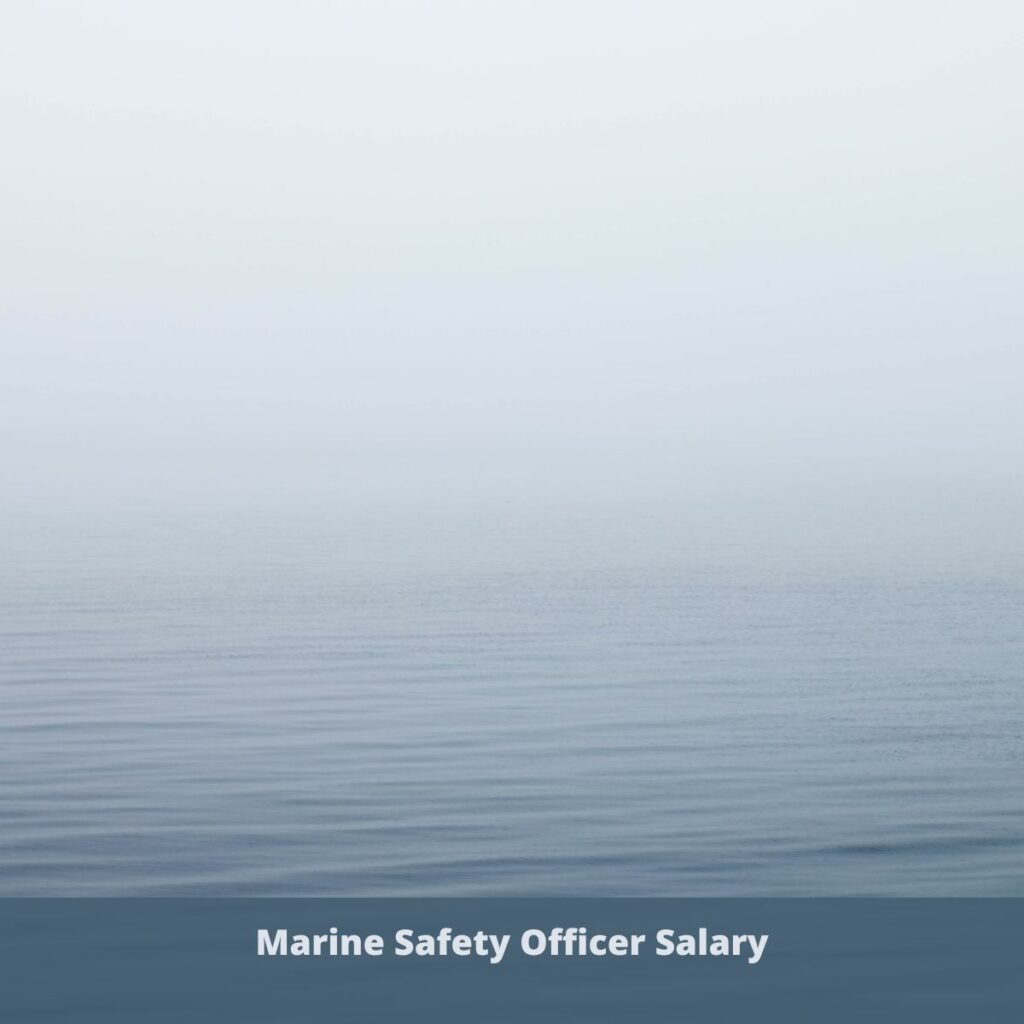Marine Safety Officer Salary: How Much Can You Expect to Earn?
If you have a passion for maritime safety and a desire to help protect the lives of those who work at sea, becoming a Marine Safety Officer (MSO) could be an ideal career choice for you. But before you embark on this career path, you may be wondering about the average Marine Safety Officer salary. In this article, we'll explore the typical salary range for MSOs, as well as the factors that can influence your earnings in this role.
What Is a Marine Safety Officer?
Marine Safety Officers (MSOs) are essential professionals in the maritime industry responsible for ensuring the safety of workers, vessels, and the marine environment. These professionals work for various organizations, including government agencies, ports, and shipping companies. The primary role of MSOs is to prevent accidents and incidents that could endanger the lives of maritime workers and cause environmental damage. They achieve this by developing and enforcing safety policies and procedures, conducting inspections, providing safety training, and investigating accidents.

The average marine safety officer salary can vary depending on several factors, including experience, education, industry, and location. According to the Bureau of Labor Statistics, the median annual salary for Occupational Health and Safety Specialists, including MSOs, was $76,230 as of May 2020. However, the salary range for MSOs can be much wider, with some earning less than $50,000 per year and others earning more than $100,000.
MSOs are responsible for conducting regular vessel inspections to ensure compliance with safety regulations. They evaluate the condition of vessels and their equipment, including the safety gear, navigation equipment, and firefighting equipment, among others. MSOs are also responsible for investigating accidents and incidents that occur on vessels and in ports. These investigations aim to identify the root cause of the accident and make recommendations to prevent similar accidents in the future.
In addition to inspections and investigations, MSOs are also responsible for developing and enforcing safety policies and procedures. They evaluate the effectiveness of existing policies and procedures and make changes as necessary to enhance safety standards. MSOs provide safety training to maritime workers to ensure they understand the risks associated with their work and how to mitigate those risks. They conduct emergency response drills and exercises to prepare workers for emergency situations such as fires, flooding, or ship collisions.
The role of an MSO is essential in ensuring the safety of workers and the protection of the marine environment. As such, the demand for MSOs is expected to grow in the coming years. This growth is expected to create new job opportunities and potentially increase the average marine safety officer salary. Therefore, individuals interested in pursuing a career as an MSO can expect to earn a decent salary while fulfilling a vital role in the maritime industry.
How Much Does a Marine Safety Officer Make?
The salary range for Marine Safety Officers can vary depending on several factors, including their level of experience, education, and the organization they work for. According to data from the Bureau of Labor Statistics (BLS), the median annual salary for Occupational Health and Safety Specialists, including Marine Safety Officers, was $76,230 as of May 2020. However, the salary range for MSOs can be much wider, with some earning less than $50,000 per year and others earning more than $100,000.
Factors That Influence Marine Safety Officer Salaries
Several factors can influence the salary range for Marine Safety Officers, including:
Experience
Experience is a crucial factor that plays a significant role in determining the marine safety officer salary. Generally, the more experience a marine safety officer (MSO) has, the higher their salary. Experienced MSOs have a better understanding of the risks associated with maritime work, and they can use their knowledge to develop more effective safety policies and procedures.
As MSOs gain more experience, they become more skilled at identifying potential hazards and mitigating risks. This can include conducting safety inspections, analyzing accident reports, and implementing new procedures to prevent future accidents. Experienced MSOs are often called upon to investigate accidents and incidents, and they can use their knowledge and expertise to identify the root cause of the accident and make recommendations to prevent similar accidents in the future.
Employers value experience when hiring MSOs, and they are willing to pay more for experienced professionals. The ability to handle complex situations and make quick decisions is critical in this profession, and experienced MSOs are better equipped to handle these challenges.
In terms of salary, MSOs with more than ten years of experience can earn significantly higher salaries than those with less experience. According to the Bureau of Labor Statistics, the median annual salary for Occupational Health and Safety Specialists, including MSOs, was $76,230 as of May 2020. However, MSOs with over ten years of experience can earn salaries well over $100,000 per year.
Experienced MSOs also have opportunities to advance in their careers, which can lead to higher salaries. For instance, they may be promoted to managerial positions where they oversee a team of safety professionals. Alternatively, they may be offered positions in different industries that require similar skills, such as environmental consulting or industrial hygiene.
Overall, experience is a crucial factor in determining the marine safety officer salary. MSOs with more experience are in higher demand and are often able to command higher salaries. Additionally, experienced MSOs have the opportunity to advance in their careers, which can lead to even higher salaries. As such, individuals interested in pursuing a career as an MSO should consider gaining as much experience as possible to maximize their earning potential.
Education is another essential factor that can influence the marine safety officer salary. Most MSOs have a bachelor's degree in a related field such as occupational health and safety, marine science, or environmental science. Individuals with higher education degrees such as a master's degree or a doctorate may earn a higher salary than those with a bachelor's degree.
A higher education degree demonstrates an individual's dedication to their profession and their commitment to continuous learning. It also shows that they have acquired advanced knowledge and skills that can be applied in their work as an MSO. This makes them more valuable to their employers, who may be willing to pay higher salaries to retain such talent.
Additionally, MSOs with certifications such as the Certified Safety Professional (CSP) or the Associate Safety Professional (ASP) may earn a higher salary than those without certification. These certifications demonstrate that an individual has a comprehensive understanding of safety principles and can apply them in their work. They are also recognized and respected within the industry, which can increase an MSO's value to their employer.
MSOs with advanced degrees or certifications may also have opportunities for career advancement, which can lead to higher salaries. For example, an MSO with a master's degree may be promoted to a management position where they oversee a team of safety professionals. Alternatively, they may be offered positions in different industries that require similar skills, such as environmental consulting or industrial hygiene.
The marine safety officer salary can vary significantly based on education level. According to the Bureau of Labor Statistics, the median annual salary for Occupational Health and Safety Specialists, including MSOs, was $76,230 as of May 2020. However, MSOs with advanced degrees or certifications can earn salaries well over $100,000 per year.
Industry
The industry in which a marine safety officer (MSO) works can also play a significant role in determining their salary. MSOs can work in various industries, including shipping and transportation, oil and gas extraction, and construction. Each industry has its own unique risks and hazards, which can affect the demand for MSOs and their corresponding salaries.
MSOs who work in the shipping and transportation industry can expect to earn a salary that is competitive with other safety professionals in the industry. This industry relies heavily on the safe operation of vessels and cargo, and MSOs are responsible for ensuring that all safety regulations are followed. According to the Bureau of Labor Statistics, the median annual salary for Occupational Health and Safety Specialists in the transportation and warehousing industry was $78,340 as of May 2020.
MSOs who work in the oil and gas extraction industry can expect to earn a higher salary than those in other industries. This industry is known for its high-risk work environments and requires specialized safety measures to protect workers and the environment. MSOs in this industry must have extensive knowledge of safety regulations and procedures specific to oil and gas extraction. According to the Bureau of Labor Statistics, the median annual salary for Occupational Health and Safety Specialists in the oil and gas extraction industry was $98,420 as of May 2020.
MSOs who work in the construction industry can also expect to earn a competitive salary. This industry is known for its high injury and fatality rates, making safety a top priority. MSOs in this industry must be knowledgeable about construction-specific safety regulations and procedures. According to the Bureau of Labor Statistics, the median annual salary for Occupational Health and Safety Specialists in the construction industry was $74,320 as of May 2020.
Overall, the industry in which an MSO works can significantly impact their salary. MSOs who work in high-risk industries, such as oil and gas extraction, can expect to earn higher salaries than those in lower-risk industries. Additionally, industries that place a high value on safety, such as shipping and transportation, may pay higher salaries to attract and retain qualified MSOs.
Location
Location is another critical factor that can influence the marine safety officer salary. The salary of an MSO can vary depending on the cost of living in the region where they work. MSOs working in metropolitan areas or high-cost-of-living states can earn higher salaries to offset the higher cost of living.
According to the Bureau of Labor Statistics, the median annual salary for Occupational Health and Safety Specialists, including MSOs, was $76,230 as of May 2020. However, the salary can vary significantly based on location. For example, MSOs working in the District of Columbia had the highest annual mean wage of $107,900, while those working in South Dakota had the lowest annual mean wage of $50,470.
MSOs working in coastal areas may also earn higher salaries than those working inland. This is because coastal areas typically have a higher demand for MSOs due to the higher risks associated with marine operations. Additionally, MSOs working in coastal areas may be responsible for overseeing compliance with federal regulations, such as the International Maritime Organization's International Safety Management Code, which can increase their value to employers.
The demand for MSOs can also vary based on the state's economy and industry. States with large port cities, such as California and Texas, may have a higher demand for MSOs due to the higher volume of shipping and marine transportation activities. States with a significant oil and gas industry, such as Alaska and North Dakota, may also have a higher demand for MSOs due to the specialized safety measures required in these industries.
How to Increase Your Marine Safety Officer Salary
If you're interested in increasing your earning potential as a Marine Safety Officer, here are a few tips to keep in mind:
Gain Experience
Gaining experience is essential for increasing the marine safety officer salary. As with many professions, experience plays a significant role in determining a marine safety officer's salary. Employers often offer higher salaries to MSOs who have several years of experience in the field.
One way to gain experience as an MSO is to work in entry-level positions in the maritime industry, such as a safety coordinator or safety officer. These positions allow individuals to gain valuable experience in safety management and operations in a maritime environment. Additionally, individuals can gain experience by participating in safety training and certification programs, such as those offered by the U.S. Coast Guard or the Occupational Safety and Health Administration (OSHA).
Another way to gain experience as an MSO is to pursue specialized training in areas such as oil spill response, vessel safety inspections, and hazardous materials management. Specialized training can make an MSO more valuable to employers and increase their earning potential.
Moreover, gaining experience can also help MSOs to advance in their careers. As MSOs gain more experience and become more knowledgeable about safety management and operations, they may be promoted to higher-level positions, such as safety directors or safety managers. These positions often come with higher salaries and more significant responsibilities.
It is worth noting that the experience required for higher salaries can vary by employer and industry. Some employers may offer higher salaries to MSOs with just a few years of experience, while others may require more extensive experience. Additionally, the salary increase for gaining experience may vary depending on the industry or location.
Obtain Certification
Obtaining certification is an essential step in increasing the marine safety officer salary. Certification demonstrates an individual's knowledge and expertise in safety management and operations, making them more valuable to employers. Many employers require certification for employment as an MSO, and some may offer higher salaries to certified MSOs.
One of the most recognized certifications for MSOs is the Certified Marine Safety Professional (CMSP) offered by the American Society of Safety Professionals. This certification requires individuals to meet specific education and experience requirements and pass an exam that covers safety management, marine safety, and maritime laws and regulations.
Additionally, the U.S. Coast Guard offers various certifications for individuals involved in marine safety, including the Marine Safety Specialist and the Marine Safety Officer certification. These certifications require individuals to demonstrate knowledge and expertise in safety management, maritime laws and regulations, and vessel safety inspections.
Other organizations, such as the Occupational Safety and Health Administration (OSHA), also offer safety certifications that may be valuable for MSOs. These certifications cover a range of safety topics, including hazardous materials management, construction safety, and general industry safety.
Obtaining certification can also provide individuals with additional professional development opportunities, such as networking with other safety professionals and attending safety conferences and seminars. These opportunities can help individuals stay up-to-date with the latest safety regulations, best practices, and industry trends, making them more valuable to employers.
Pursue Advanced Education
Pursuing advanced education is a valuable way to increase the marine safety officer salary. Advanced education can provide individuals with a deeper understanding of safety management and operations, making them more valuable to employers. Employers may offer higher salaries to MSOs with advanced degrees, such as a master's degree in safety management or a related field.
Many universities offer degree programs specifically designed for individuals interested in pursuing a career in safety management and operations. These programs may cover topics such as safety regulations, hazard identification and control, and emergency response planning. Pursuing a degree in safety management or a related field can help individuals develop the skills and knowledge necessary to succeed as an MSO and increase their earning potential.
In addition to traditional degree programs, there are also various online courses and certifications available for individuals interested in pursuing advanced education in safety management and operations. These programs may cover specialized topics such as hazardous materials management, oil spill response, or vessel safety inspections.
Pursuing advanced education can also provide individuals with additional professional development opportunities. For example, attending safety conferences and seminars can help individuals network with other safety professionals, stay up-to-date with the latest safety regulations and industry trends, and gain new insights into safety management and operations.
While pursuing advanced education can be time-consuming and expensive, it can pay off in the long run by increasing an MSO's earning potential and providing them with additional career opportunities. Employers may offer higher salaries to MSOs with advanced degrees, and individuals with advanced degrees may be more likely to be promoted to higher-level positions, such as safety directors or safety managers.
Networking is an essential aspect of increasing the marine safety officer salary. Networking allows individuals to connect with other safety professionals, learn about job opportunities, and gain insights into the safety management and operations industry. Networking can help MSOs build relationships with potential employers and may lead to higher salaries and career advancement opportunities.
One way to network in the safety management and operations industry is to attend safety conferences and seminars. These events provide individuals with the opportunity to meet other safety professionals, learn about the latest safety regulations and industry trends, and gain new insights into safety management and operations. Attending these events can help MSOs build relationships with potential employers and may lead to new job opportunities or career advancements.
Another way to network is to join professional organizations such as the American Society of Safety Professionals or the National Safety Council. These organizations provide individuals with access to industry resources, job postings, and networking events. Joining these organizations can help MSOs build relationships with other safety professionals and may lead to higher salaries and career advancement opportunities.
Social media platforms such as LinkedIn can also be valuable networking tools for MSOs. LinkedIn allows individuals to connect with other safety professionals, share industry insights and knowledge, and learn about job opportunities. Building a strong LinkedIn profile and regularly engaging with other safety professionals can help MSOs build their professional network and may lead to higher salaries and career advancement opportunities.






